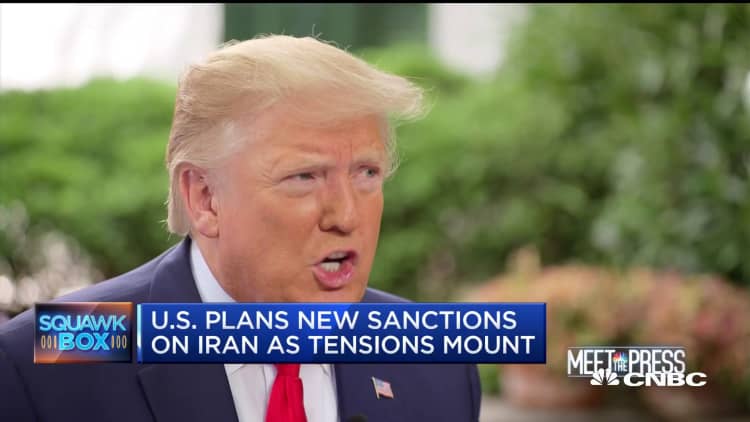
The Trump administration said over the weekend that the United States is prepared to negotiate with Iran without preconditions, days after the two countries nearly came to blows over a downed American surveillance drone.
President Donald Trump, when asked whether he had conditions for talking with Iran, said "not as far as I'm concerned, no preconditions," though he reiterated that his administration expected Iran to discuss its nuclear program.
The president made his comments in a wide-ranging interview with NBC's "Meet The Press."
Trump's position was reiterated by Secretary of State Mike Pompeo as he prepared to depart for the Middle East.
"We're prepared to negotiate with no preconditions," Pompeo told reporters Sunday. "I am confident that at the very moment they are ready to engage with us, we will be able to begin these conversations."
But Vice President Mike Pence, in an interview with CNN's "State of The Union," said "Iran needs to understand we'll never allow them to obtain a nuclear weapon and we will not allow them to continue to sow violence across this region."
Pence said he was not aware of any outreach from Iran.
Pompeo said he would travel to Saudi Arabia and the United Arab Emirates to make sure that the U.S. is "strategically aligned" with its allies.
"We'll be talking with them about how to make sure that we are all strategically aligned and how we can build out a global coalition," Pompeo said.
Trump called off military strikes against Iran last week, after the Islamic Republic shot down an unmanned U.S. drone with a surface-to-air missile.
The president said he was concerned about the loss of life and did not believe a military operation that results in casualties was a proportionate response to Iran's actions.
Trump said Saturday that the U.S. would impose additional sanctions against Iran on Monday, but Iran dismissed the threat as "just propaganda."
Iranian Foreign Ministry spokesman Abbas Mousavi said "all sanctions...have been imposed and there are no more sanctions left," according to the state-run news agency IRIB.
President Trump, for his part, said he believed a deal was possible.
"We could have a deal with them very quickly if they want to do it, it's up to them," Trump said. "But if Iran wants to become a wealthy nation again, become a prosperous nation, we'll call it, let's make Iran great again."
Tensions between Iran and the U.S. have escalated in recent weeks. Tehran claimed the downed drone violated its airspace, while Washington says it was operating in international airspace.
The Trump administration has also accused Iran of attacking two oil tankers in the Gulf of Oman, near the Strait of Hormuz, a critical transit route for global oil supplies.
Iran has strongly denied involvement in the explosions that crippled the tankers.
Trump last year pulled out of an international agreement, negotiated by the Obama administration, that sought to limit Iran's nuclear program in return for sanctions relief. The Trump administration has slapped sanctions back on Iran in an effort to pressure the Islamic Republic into making greater concessions.
-- Reuters contributed to this report


